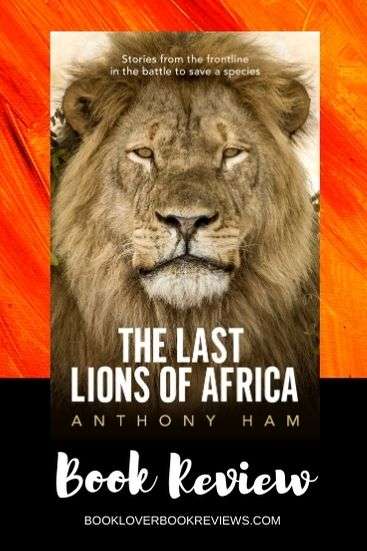The Last Lions of Africa by Anthony Ham, Review: Majestic peril
The Last Lions of Africa by Anthony Ham is a thought-provoking read about the challenges lions and those trying to save them face. Read on for our full review.
The Last Lions of Africa Synopsis
 Stories from the frontline in the battle to save a species
Stories from the frontline in the battle to save a species
This is the riveting and illuminating story of Australian writer Anthony Ham’s extraordinary journey into the world of lions. Haunted by the idea that they might disappear from the planet in our lifetime, he ventured deep into the African wilderness, speaking to local tribespeople and activists as well as to rangers, scientists and conservationists about why lions are close to extinction and what can be done to save them.
In The Last Lions of Africa, we walk alongside Anthony as he reveals the latest extraordinary science surrounding the earth’s dwindling lion populations and their often surprising relationship to mankind. As he uncovers heartbreaking and astonishing accounts of individual lions, prides and habitats, each chapter unfolds as both gripping campfire story and deeply researched exploration of larger mysteries in the natural world.
Anthony’s vivid storytelling weaves together natural history, ancient lore and multidisciplinary science to show us a world in which human populations are growing and wild lands are shrinking; where lions and indigenous peoples fight not for sovereignty over the land but for their very existence. In this gripping and crucial book, Anthony Ham brings Africa, its people and its endangered lions to magnificent life and shows the surprising ways those last lions might be saved.
(Allen & Unwin – August 2020)
Genre: Non-Fiction, Memoir, Action-Adventure
Disclosure: If you click a link in this post we may earn a small commission to help offset our running costs.
Would you like a hand-curated personalised set of book recommendations from Booklover Book Reviews? LEARN MORE >>
BOOK REVIEW
In The Last Lions of Africa Anthony Ham explores the various factors that have contributed to the decline of this apex predator and the many challenges faced by those trying to save them.
Unlike the cheetah and the leopard, the lion is a cat of few mysteries, one of the few species in the world that can afford to be visible and at rest. … They lay in arrogant repose – one even lay on his back, stomach exposed, four legs splayed like a house cat waiting for someone to tickle his tummy. This was a cat with nothing to fear.
But looks can be deceptive.
The book is comprised of five insightful essays, each focussing on a different aspect of the struggle and/or lion region in Africa. My favourite amongst these the story of a lone lioness that developed an unusual bond with a wildlife ranger.
Ham marries well his journalistic approach to investigating the drivers of change and interpreting information gleaned from experts with his own passionate interest in the subject matter.
He offers readers a remarkably balanced assessment of historical and recent events, from lion pride behaviour through to political game-playing and urban sprawl. For example, he does not downplay economic imperatives, nor does he sugarcoat the first-hand experiences of those that have lasting injuries or witnessed loved ones dragged from their beds and consumed by lions. And, while not particularly palatable, he considers the conservationists’ theoretical argument that trophy-hunting could actually be the key to the lion species’ survival. The Last Lions of Africa is a very ‘real-world’ discussion of the challenges faced by lion conservationists.
Writing style
In parallel, the author’s respect for both the indigenous people and their historical relationship with lions, and the myriad flora and fauna that make up the African ecosystem, shines through evocative description.
Immobile, the bulls stood like statues cast in granite, eternal sentinels on the plain, gatekeepers to some lost civilisation. They seemed faintly absurd — their handlebar horns, fly-blown beards and long eccentric-uncle faces brought to mind the sidely held African legend that the wildebeest was cobbled together from the spare parts of other animals left over in the last days of Gold’s creation. Even so, there was nobility in their resolute stance.
Ham understands well the power of storytelling to engage, raise awareness and change behaviour, whether in folklore or modern memoir. His writing style is an appealing mix of evocative scene-setting, objective reporting and commentary on personal experience.
From first light, clouds hung low over Nairobi like messengers of doom, and occasional downpours did nothing to relieve the suspense. People looked skyward, worrying, even in the city, that the rains would be late again. Memories of 2009 were still fresh, when the worst drought in living memory brought starvation and tens of thousands more inhabitants to the city’s slums, as well as the fear that a reckoning would one day come.
Anthony Ham’s The Last Lions of Africa is a fascinating and thought-provoking read about these majestic creatures in peril. The colour photo insert, allowing readers to put faces to those featured in the essays (both human and lion) is a lovely touch also. A book that would make an excellent Father’s Day gift.
BOOK RATING: The Story 4 / 5 ; The Writing 4 / 5
Get your copy of The Last Lions of Africa from:
Bookshop US Amazon Booktopia (AU) Book Depository

More reviews of The Last Lions of Africa
‘Bravely pursued, acutely observed and elegantly told.’ – John Vaillant, author of The Tiger
‘Urgent and important. This moving tale with a heroic cast of characters, leonine and human, is a must-read for anyone passionate about wildlife and wild places.’ – Tony Park, author of Last Survivor
If you like the sound of The Last Lions of Africa, you may also enjoy:
An Elephant in My Kitchen by Francoise Malby-Anthony / Tales of an African Vet by Dr Roy Aronson / Dogs with Jobs by Laura Greaves / The Dinosaur Artist by Paige Williams / Only the Animals by Ceridwen Dovey
About the Author, Anthony Ham
Anthony Ham is a freelance writer and photographer who, over the last eighteen years, has built a reputation as a trusted guide and expert companion for a generation of adventurous readers and safari travellers. A veteran nature and travel writer, Anthony’s work has appeared in newspapers and magazines in Australia and worldwide, including The Age, The Sydney Morning Herald, The Monthly, Virginia Quarterly Review (VQR – US), National Geographic Traveler (US), BBC Wildlife (UK), Lonely Planet Magazine (UK), Africa Geographic (UK), The Independent (UK), Travel Africa (UK), and others.
Anthony has written more than 100 guidebooks for Lonely Planet. In doing so, he has become a trusted name, both for editors – in nearly twenty years as a writer, Anthony has never submitted work late, and has become Lonely Planet’s go-to writer for difficult assignments – and for readers whose lives depend on him getting the facts right. His titles include bestselling guides to Kenya, Tanzania, East Africa, and Botswana & Namibia. Since the beginning of 2016 alone, guidebooks he has written have sold more than 125,000 copies worldwide.
* My receiving a copy from the publisher for review purposes did not impact the expression of my honest opinions.
This review counts toward my participation in the Aussie Author Challenge 2020 and the 2020 Nonfiction Reader Challenge.
